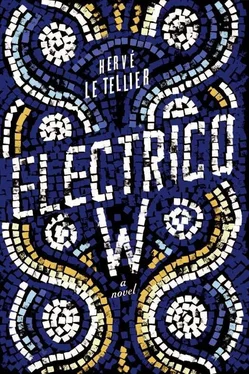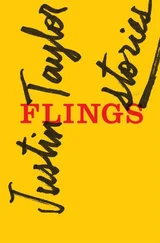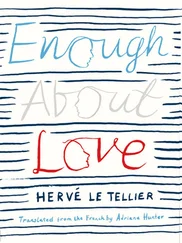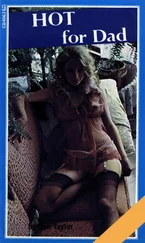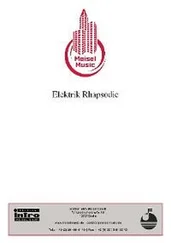She picks up her coffee cup, takes a small sip, then puts the cup back down. Without looking up, she says: “There’s someone who exactly matches your description behind you, she’s admiring some glass jugs in a window. One point to you.”
“You see, I’m not lying.”
“Mmm …” She stares at me sardonically, a touch of pink on her eyelids heightens the green of her eyes. It’s quite ordinary makeup, but she hasn’t overdone it.
“Or she’s your accomplice,” she says. “That’s it. You arrange these setups together. You do it for her, she does it for you.” I must be looking desperate because she adds: “Okay, okay, I believe you.”
She lowers her sunglasses and stops talking. I can’t make out her eyes now and guess she’s secretly watching Irene.
“She’s very young, your girlfriend …”
“Twenty-two, twenty-three, I think.”
“Like I said.”
I blush, this stranger is in a good position to spell out the truth to me.
“So then, I’m meant to be your mistress, am I? Am I meant to have a name?”
“I told her about a Lena … Lena Palmer.”
“She sounds like a heroine from a TV series.”
“It’s — it’s meant to be your husband’s surname. You’re … you’re going through a divorce.”
“What about you? What’s your name? I know you’ve already told me, but I was angry and I don’t remember it.”
“Balmer.”
“Balmer … And I’m Palmer, is that right?” she asks. “That’s completely ridiculous. And what’s your first name, you fool. Do you really think I’d call the man of my life by his surname?”
“Vincent.”
“Vin-cent Bal-mer …” she lets the syllables hang in the air, to let their perfume take hold of her. “And I’m Manuela. Manuela Freire. Your story’s totally absurd. Which is why I believe it. It’s like Catholic faith … Credo quia absurdum , right?”
She stops talking, slips her sunglasses onto the top of her head, and looks at me for a long time. It’s then that I realize I dared approach her and embark on this because her face looked familiar, you could even say like a friend. If she were seventeen with slightly longer hair, she could be the twin sister of the very young actress in Thirty Years Without Seeing the Sea . That first feature by an unknown filmmaker enjoyed far too little success, but the actress took it to heart. What was her name? Clémence Guatteri? Constance Guettari? It doesn’t matter.
The story is easily summarized: a teenage girl, probably running away from home, sets off from an anonymous suburb, hitchhiking her way to meet her boyfriend in northern Germany, in Lübeck, where he works as an apprentice chef in a French restaurant. Filmed in parallel is the story of a Polish hitchhiker in his thirties armed with a tourist visa — secured God knows how — who arrives on the outskirts of Paris, on the last leg of his journey to the Mediterranean which he’s dreamed about his whole life. They meet at a gas station. She’s been caught stealing biscuits by the manager, who’s about to call the police, so the man steps in and pays for them for her. He instantly falls in love with this very young girl and when she tells him she’s going to meet up with her boyfriend in Lübeck, he says he’s heading home to Gdańsk. Lübeck isn’t far out of his way, and he suggests they travel together. During those few days traveling he protects her with great tact, aware of how lost and yet determined she is, how full of confidence but ready to snap like a thread stretched too tight. And yet she is so luminous and expects so much of life that she is the one to show him the world. She talks and he just listens, fascinated, never admitting his profound distress. He feels his love for her is forbidden, scandalous, and he suffers at the thought — or the impression — that he’s too old to deserve her. She’s drawn to him, but too inexperienced to interpret her confusing feelings. When they arrive in Lübeck and, in front of him, she calls her boyfriend to announce jubilantly that she’s there, the Pole realizes the boy wasn’t expecting her, doesn’t want her anymore. She hangs up and bursts into tears, he comforts her and she’s ready to give herself to him, in despair, in a desperate craving for tenderness too, but he loves her too much to want her at that price. He offers her a train ticket back to Paris. She accepts, they exchange an awkward kiss on the station platform, and she steps onto the train, distraught. He doesn’t have enough money left to see the Mediterranean, and hitches a ride home. He actually lived in Lublin, much farther south than Gda?sk.
Thirty Years Without Seeing the Sea is a succession of sensitive, allusive tableaux. The filmmaker must have been fresh out of film school: the framing, camera movements, and even the film’s rhythm betray its influences, from Tarkovsky to Nicolas Roeg, but in the arts there is no sentiment more stupid than a fear of being influenced. The film ends with a very long tracking shot: the girl standing in the train corridor, her cheek resting against the window, her eyes dry and red, watching the rain. Then the camera gradually pans, and the shot is no longer lost in a drowning landscape but begins, as the girl herself does, to see a new landscape appear. The sky is clearing, the sun’s going to come out.
I remember sitting alone in the darkened room, seeing how intense and dazzling that girl was, suddenly filled with the conviction that I had never truly lived, and I couldn’t help my tears flowing.
Manuela Freire has the same fine features and radiates the same charm. Yes, ten or fifteen years later, that runaway teenager, now grown calmer, serene even, could easily cut her dark hair and look like her sister.
I make an automatic nervous gesture, bringing my fingers up to my mouth. Manuela raps her index finger sharply on the back of my hand.
“You could at least stop biting your nails, it’s disgusting. Do you know, your friend’s completely fascinated by a hideous cherry-red butter dish? What’s her name, by the way?”
“Irene.”
“She’s not bad. Well, if you like that type. That girl’s the sort to fuel a few fires. I’m guessing she showed you a thing or two, didn’t she?”
She takes a sip of her coffee, watches me cheerfully.
“Ah, she’s moving a bit. O-kay. She’s moved a whole yard. Now she’s completely focused on a soup tureen. Does this Irene of yours like soup?”
“E — excuse me?”
“Soup. S-o-u-p. Broth, consommé, bouillon?”
“I–I don’t know.”
“You don’t know? Now, that’s a bad sign. You have to know everything a woman likes and dislikes, if you want to keep her. How old are you?” she adds, frowning.
I hesitate for a moment. “Thirty … thirty-nine.”
“Really?”
She knits her brow like an angry schoolteacher and I stammer awkwardly, “Yes, yes, I promise you, it’s true, I’ll be forty in June, next year.”
She laughs properly for the first time. She has pretty little teeth in perfect ivory.
“It’s okay, I believe you, I believe you. In fact, I’m even going to pay you a compliment, it’ll relax you: you look younger than that. I’m thirty-three.”
She reaches for her sunglasses on top of her head and brings them down to the bridge of her nose. Not seeing her eyes makes me uncomfortable, I feel more and more at her mercy.
“And, just out of curiosity, why did you choose me?”
“Well …”
“There wasn’t much choice, is that it?”
I’m fumbling for words, but she’s not waiting for an answer: “Aha, your wannabe Sherlock Holmes has now moved to the other side of the store, and because it’s on a street corner, she’s watching us through the windows.”
Читать дальше
